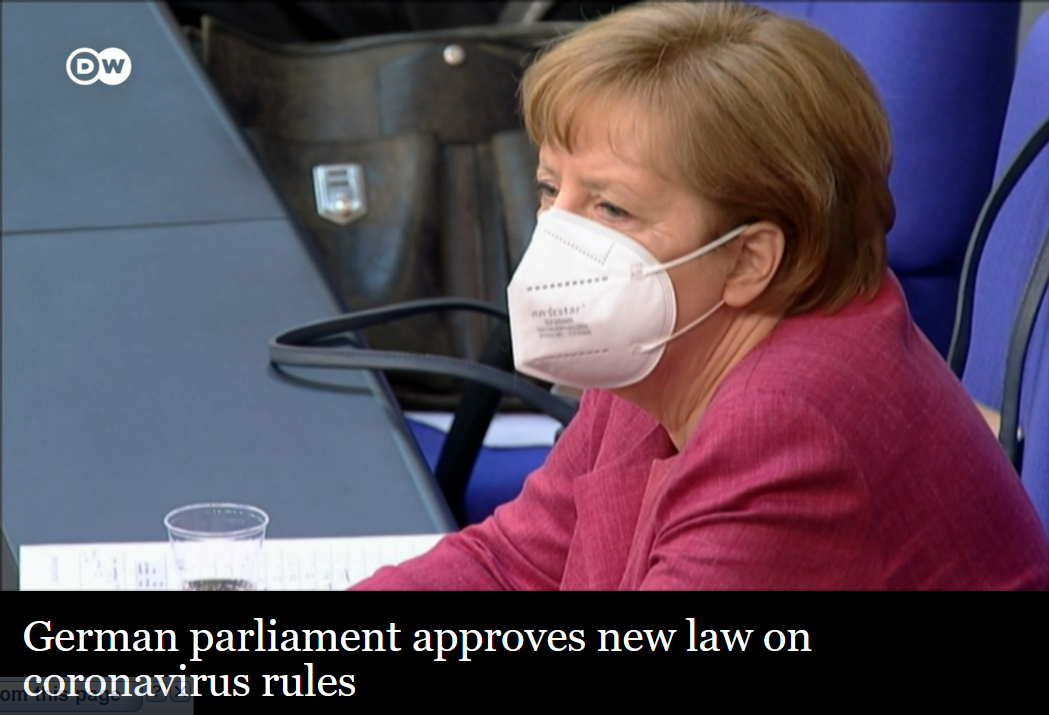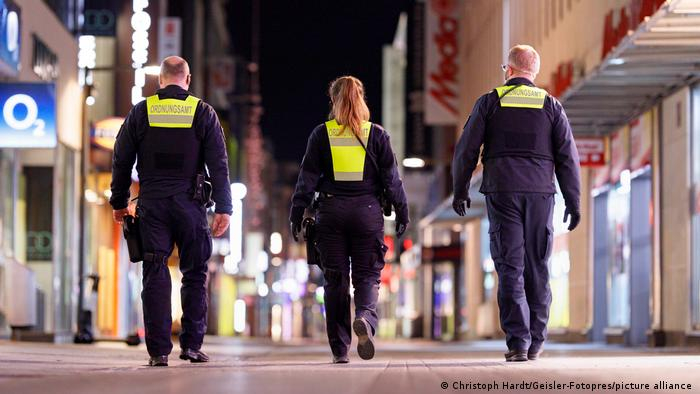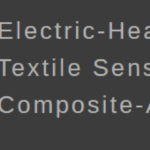People across Germany are facing curfews and shop closures with the new coronavirus rules. Here is what to expect.
- Coronavirus hotspots will face a 10 p.m. to 5 a.m. curfew
- Germany’s new coronavirus lockdown rules came into effect on Saturday. Cities and districts that are deemed coronavirus hot spots will be affected.
- New measures include curfews, school closures and shop closures.
What are the new rules? - If cities or districts exceed a seven-day incidence rate of 100 new infections per 100,000 inhabitants over three consecutive days, then local authorities must:
- Restrict personal contacts to one household and one other person, not counting children under 14. Exemptions include meetings of spouses and partners or the exercise of custody and access rights.
- Implement a 10 p.m. to 5 a.m. curfew with exceptions for walking and jogging alone until midnight. Other exceptions could be made for emergencies, professional practice, nursing and care, animal care, or other significant reasons.
- Ensure nonessential shops only allow customers in with a negative COVID-19 test and an appointment. If the incidence rate exceeds 150, customers can only pick up preordered goods (also known as click & collect).
- Close in-person teaching at schools if the incidence rate exceeds 165. Exceptions for graduating classes and special schools are possible. From 100 to 165, alternate attendance teaching days are required.
- Limit funerals to 30 mourners.
Other regulations include:
Leisure: Facilities such as swimming pools, saunas, clubs, brothels, wellness centers, solariums, fitness studios, excursion boats or indoor playgrounds must close.
Culture and zoos: Theaters, operas, concert halls, stages, music clubs, cinemas (except drive-in cinemas), museums, exhibitions and memorials must close, and related events are also prohibited. Outdoor areas of zoos and botanical gardens can remain open to visitors with a current negative test.
Shops that can stay open: Food retailers, beverage stores, health food stores, baby stores, pharmacies, medical supply stores, drugstores, opticians, hearing aid specialists, gas stations, newsagents, bookstores, florists, pet supplies and feed stores, garden centers and wholesalers will continue to be exempt from closures or severe restrictions. However, they can only sell their usual range of products.
Sports: Only non-contact individual sports will be allowed, which can be practiced alone, in pairs or with members of one’s household. There are exceptions for professional and competitive athletes. For children up to 14 years of age, sports in groups should continue to be possible.
Gastronomy: Restaurants and cafes must remain closed, with exceptions for dining rooms in rehabilitation centers or nursing homes, catering for the homeless or long-distance truck drivers, and similar circumstances. Takeaway food and beverage pickup remain permitted, as does delivery.
Close-to-body services: Services that involve physical proximity to the customer are prohibited. However, medical, therapeutic, nursing, pastoral, hairdresser and chiropody services are exempt, usually with a negative test and an FFP2 mask.
Public transport: Passengers and staff in buses, trains and taxis must wear an FFP2 mask. If possible, only half of the regular number of passengers should travel.
Tourism: The rental of tourist accommodation is prohibited.
Workplace: Businesses must provide employees with two coronavirus tests per week. If possible, employers must allow employees to work from home, and workers typically must accept this offer.
Punishment: Violations will normally lead to an administrative offense, leading to a fine. Depending on severity, that could be €25,000 ($30,000), but most fines are expected to be between €100 and €500.
German parliament approves new law on coronavirus rules
Where will the new rules apply?
Large parts of Germany already exceed the limit, including many rural communities and large cities such as Berlin, Cologne, Frankfurt and Munich.
Most regions in Germany fall above the 100 threshold, and almost half fall over the 165 limit. The status of each district can be monitored on the dashboard by the Robert Koch Institute (RKI) for infectious diseases.
The stricter rules will apply until the seven-day incidence falls below 100 for five consecutive days. The law will stand until June 30, with any further changes requiring parliamentary approval. If states have stricter regulations in place, they will continue to apply.
Merkel calls for compliance
German Chancellor Angela Merkel defended the rules in her weekly video podcast, saying they were harsh, but necessary. Merkel appealed to the public to comply with the measures.
“If we succeed now in reducing infections significantly and quickly, step-by-step relaxations will be possible in the foreseeable future,” she said. “Let us now once again do what is necessary and together show consideration and responsibility.”
She cited more contagious variants, and daily highs of intensive care patients in hospitals as reasons to abide by the rules.
“What we’re hearing from doctors and the nursing staff, these are real cries for help,” she said. “We — the state, society, citizens — we all have to help.”
“As much as one would wish there were less burdensome ways to break and reverse the third wave — there are not,” Merkel said.
What do the experts say?
The head of the association of general practitioners in Germany (Virchowbund) said the new rules should help rapidly reduce infection numbers.
“I see the chance that the third wave will be broken,” Dirk Heinrich told the Neue Osnabrücker Zeitung on Saturday.
Is the law being challenged?
The most controversial element of the new restrictions is the nighttime curfew, and lawsuits against the rules are already pending before the Federal Constitutional Court.
Conservative daily Die Welt called the new law “an authoritarian fig leaf designed to conceal failures of strategy, vaccination and testing.”
The pro-business FDP party vowed to take legal action to have it overturned.
Celebrities have criticized the law, but many have since backtracked.
What is the current status of the pandemic?
Across Germany, there were 23,393 new cases reported on Saturday, according to the RKI. The nationwide seven-day average of cases per 100,000 people remained steady at 164.
Eight German states have an incidence rate above 165.





